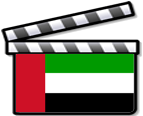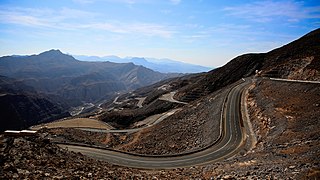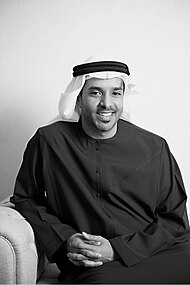
The United Arab Emirates is a country in the eastern part of the Arabian Peninsula located on the southeastern coast of the Persian Gulf and the northwestern coast of the Gulf of Oman. The UAE consists of seven emirates and was founded on 2 December 1971 as a federation, after UK armed forces left the region. Six of the seven emirates declared their union on 2 December 1971. The seventh, Ras al Khaimah, joined the federation on 10 February 1972. The seven sheikdoms were formerly known as the Trucial States, in reference to the truce treaties established with the British in the 19th century.

The United Arab Emirates (UAE), or simply the Emirates, is a country in West Asia, in the Middle East. It is located at the eastern end of the Arabian Peninsula and shares borders with Oman and Saudi Arabia, while also having maritime borders in the Persian Gulf with Qatar and Iran. Abu Dhabi is the country's capital, while Dubai, the most populous city, is an international hub.

Ras Al Khaimah (RAK) is one of the seven emirates that make up the United Arab Emirates (UAE). The city of Ras Al Khaimah, abbreviated to RAK or RAK City, is the capital of the emirate and home to most of the emirate's residents. It is linked to the Islamic trading port of Julfar. Its name in English means "headland of the tent". The emirate borders Oman's exclave of Musandam, and occupies part of the same peninsula. It covers an area of 2,486 km2 (960 sq mi) and has 64 km (40 mi) of beach coastline. As of 2015, the emirate had a population of about 345,000.

Ras Al Khaimah International Airport is an international airport located in the Emirate of Ras al-Khaimah, United Arab Emirates 11 nautical miles south of Ras Al Khaimah, on the coast of the Persian Gulf. The airport has two passenger terminal buildings as well as cargo, aircraft maintenance, and aviation training facilities.

Masafi is a village located on the edge of the Hajar Mountains in the United Arab Emirates. It sits at the inland entrance of the Wadi Ham, which runs down to Fujairah City. The border between the emirates of Fujairah and Ras Al Khaimah runs through the town, which houses a barracks used by the United Arab Emirates Armed Forces.

Ajman is the capital of the emirate of Ajman in the United Arab Emirates. It is the fifth-largest city in UAE after Dubai, Abu Dhabi, Sharjah and Al Ain. Located along the Persian Gulf, it is engulfed by the larger emirate of Sharjah in territory.
The Al Bu Muhair are a tribe of the United Arab Emirates (UAE), closely associated with the Bani Yas of Abu Dhabi but settled throughout the western coastal areas of the Emirates.

Cinema of the United Arab Emirates began with a number of feature films that were broadcast on national television since the late 1980s.

The Emiratis are the native citizen population of the United Arab Emirates. Within the UAE itself, they number approximately 1.15 million.
Indians in the United Arab Emirates constitute the largest part of the population of the country. Over 3,860,000 Indian expats are estimated to be living in the UAE, which is over 38 percent of the total population of the UAE and the fourth highest number of overseas Indian people in the world, after the United States, Saudi Arabia and Nepal. Indian contact with the emirates that now constitute the UAE dates back several centuries, as a result of trade and commerce between the emirates and India. The UAE has experienced a tremendous increase in the population of resident Indians who initially migrated to the country as a result of opportunities in petroleum. Now, Indians are key to the UAE's construction, retail, financial services, healthcare, manufacturing and transport sectors. A sizeable minority of Indian migrants are involved in professional services and entrepreneurship. Relations between India and the UAE have traditionally been very friendly.

The Trucial States, also known as the Trucial Coast, the Trucial Sheikhdoms, Trucial Arabia or Trucial Oman, was a group of tribal confederations to the south of the Persian Gulf whose leaders had signed protective treaties, or truces, with the United Kingdom between 1820 and 1892.
The military history of the United Arab Emirates describes the military history of the United Arab Emirates Armed Forces. Prior to the union of the emirates, different tribal confederations formed the de facto military force which was dominant in the area now known as the United Arab Emirates. The Bani Yas and Al Qawasim were the most significant of those tribal confederations. The official formation of the military began with the formation of the Truical Oman Levies by the British Empire on 11 May 1951 as the area was under a British protectorate.

The Higher Colleges of Technology(HCT) (Arabic: كليّات التقنيّة العليا) is a public institute of technology with 16 campuses and facilities throughout the United Arab Emirates. Founded in 1988 by Sheikh Nahyan bin Mubarak al-Nahyan, it is the largest applied higher educational institution in the country.

Sheikh Saud bin Saqr Al Qasimi is the current ruler of the Emirate of Ras Al Khaimah, one of the seven emirates of the United Arab Emirates. He became the chief of the ruler’s Emiri court in 1979, the head of the Municipal Council in 1986, and the Crown Prince and Deputy Ruler of the Emirate in June 2003. Then, he officially became the ruler of the Emirate of Ras Al Khaimah in 2010 after his father’s death.

While being a major oil producing country, the United Arab Emirates (UAE) has taken steps to introduce solar power on a large scale. However, solar power still accounts for a small share of energy production in the country. The country was the 6th top carbon dioxide emitter per capita in the world in 2009, with 40.31 tonnes, but is planning to generate half of its electrical energy by 2050 from solar and nuclear sources, targeting 44% renewables, 38% gas, 12% coal, and 6% nuclear energy sources.

Piracy in the Persian Gulf describes the naval warfare that was prevalent until the 19th century and occurred between seafaring Arabs in Eastern Arabia and the British Empire in the Persian Gulf. It was perceived as one of the primary threats to global maritime trade routes, particularly those with significance to British India and Iraq. Many of the most notable historical instances of these raids were conducted by the Al Qasimi tribe. This led to the British mounting the Persian Gulf campaign of 1809, a major maritime action launched by the Royal Navy to bombard Ras Al Khaimah, Lingeh and other Al Qasimi ports. The current ruler of Sharjah, Sultan bin Muhammad Al Qasimi argues in his book The Myth of Piracy in the Gulf that the allegations of piracy were exaggerated by the East India Company to cut off untaxed trade routes between the Middle East and India.

Commemoration Day, previously known as Martyrs' Day, is a national holiday in the United Arab Emirates recognizing the sacrifices and dedication of Emirati martyrs who have given their life in the field of civil, military and humanitarian service. The day is marked annually on 30th of November, but observed with a public holiday on the 1st of December. It was in 2015, when the late His Highness Sheikh Khalifa Bin Zayed Al Nahyan, declared the day as Martyrs Day in honor of those who sacrificed their lives for the country. The observance and public holiday were both previously held on 30th of November (pre-2019).

EmiratiArabic refers to a group of Arabic dialectal varieties spoken by the Emiratis native to the United Arab Emirates that share core characteristics with specific phonological, lexical, and morphosyntactic features and a certain degree of intra-dialectal variation, which is mostly geographically defined. It incorporates grammatical properties of smaller varieties within the UAE, generally of tribal nature, which can be roughly divided into a couple of broader sub-varieties: the first spoken in the Northern Emirates of Dubai, Sharjah, Ajman, Umm al-Quwain, and the western part of Ras al-Khaimah; the second in the eastern part of the country, mainly in Fujeirah, Dibba, Khor Fakkan, Hatta, Kalba, and the eastern part of Ras al-Khaimah; the third in Abu Dhabi including the oasis city of Al Ain, the dialect is also seen in the Omani region of Al-Buraimi. Emirati Arabic varieties can also be distinguished based on environmental factors, including variations associated with Bedouin communities, coastal, agricultural, and mountainous regions.

Ras Al Khaimah (RAK) is the largest city and capital of the Emirate of Ras Al Khaimah, United Arab Emirates. It is the sixth-largest city in UAE after Dubai, Abu Dhabi, Sharjah, Al Ain and Ajman. The city is divided by a creek into two parts: old town in the west and Al Nakheel in the east.

Tourism in the United Arab Emirates is an important part of the Emirati economy, and consists of domestic and international components. In 2018, tourist industry composed over 2 dirham to country's GDP.















